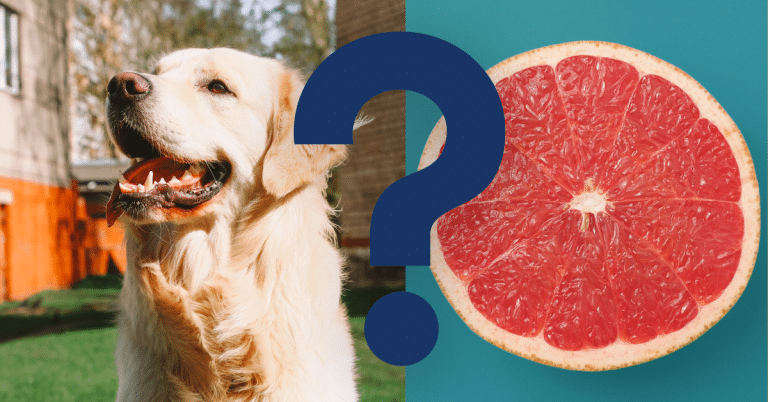Can Dogs Eat Green Onions? A Vet’s Opinion

Green onions are long, slender ones with green tops and white bulbs often used in cooking, but can you feed green onions to your dog?
No, green onions should not be fed to dogs. Green onions, also known as scallions, are members of the Allium family, along with onions, garlic, and shallots. Allium plants contain chemicals that can are toxic to dogs in high concentrations. Green onions can cause gastrointestinal discomfort and red blood cell destruction, potentially leading to anemia. It is advised to avoid feeding green onions to dogs and instead provide them with safe, nutritious alternatives.
Benefits Of Green Onions For Dogs
When given in moderation, green onions, commonly known as scallions, can provide some health benefits to dogs. Here are some potential advantages:
Essential Nutrients
Green onions are high in critical vitamins and minerals such as vitamins A, C, and K, as well as calcium, potassium, and fiber. These minerals are beneficial to a dog’s overall health and well-being.
Anti-Oxidant Properties
Green onions include anti-oxidants, which aid in the fight against damaging free radicals in the body. It can help reduce inflammation and boost the immune system.
Aid In Digestion
Green onions have a high fiber level, which can help promote healthy digestion and prevent constipation. It promotes regular bowel movements and a healthy gut environment.
Fresh Breath
Green onions have natural antibacterial characteristics that can help improve your dog’s breath. Chewing on green onion stalks can aid in treating bad breath produced by bacteria in the mouth.
Despite these possible benefits, it is crucial to emphasize that green onions should only be fed to dogs in tiny amounts and as a treat on occasion. The rationale for the warning is that green onions are members of the Allium family, which includes onions and garlic. Allium plants contain chemicals that can be poisonous to dogs in excessive quantities. As a result, excessive consumption of green onions should be avoided because it might cause gastrointestinal irritation, damage to red blood cells, and possibly anemia.
Contacting a veterinarian before introducing green onions into your dog’s diet is best. They may offer personalized advice based on your dog’s individual health needs and guarantee that the amount offered is safe for intake.

How To Safely Give Green Onions To Dogs
While it is typically advised to avoid giving green onions to dogs owing to the possibility of toxicity, if you still want to offer small amounts as an occasional treat, here are some suggestions to follow for safe consumption:
Consult A Veterinarian
Speaking with a veterinarian before introducing green onions or new food into your dog’s diet is critical. They may give personalized advice based on your dog’s health issues, breed, age, and dietary needs.
Small Amounts
Suppose your veterinarian permits offer green onions in small amounts as a reward on occasion. Begin with a tiny bit and observe your dog’s reaction. If no adverse effects occur, you can progressively raise the amount over time, but always in moderation.
Prepare With Caution
Wash fresh green onions well to remove dirt or pesticides before preparing and serving. Remove the root end and the dark green crowns, leaving only a little bit of the light green or white area. Chop the remaining amount into fragile pieces to make your dog’s chew and digest easier. To soften the green onions before serving, steam or lightly sauté them.
Observe Your Dog’s Reaction
After your dog eats green onions, please pay attention to their behavior and any potential side effects. Watch for any signs of stomach disturbance, such as vomiting, diarrhea, or discomfort. Watch for changes in their appetite, energy levels, or overall health. If you experience adverse effects, stop giving green onions and visit your veterinarian.
Consider Alternate Options
Instead of green onions, consider alternative dog-friendly vegetables with equal nutritional benefits. Carrots, green beans, and cooked sweet potatoes are safer alternatives that can add vitamins, minerals, and fiber to your dog’s diet.
Remember that the main worry with green onions is their toxicity to dogs. Some dogs may have adverse reactions even with careful preparation and modest amounts. Prioritize your dog’s safety and speak with a veterinarian to identify the most appropriate and safe food for your canine companion.
Will Green Onions Make A Dog Sick?
Due to their toxicity, green onions could cause various illnesses in dogs. The following are some of the ailments and symptoms that may arise if a dog consumes green onions:
Gastrointestinal Discomfort: Green onions can cause gastrointestinal upset in dogs. Vomiting, diarrhea, abdominal pain, and loss of appetite are all possible symptoms.
Hemolytic Anaemia: Compounds found in Allium plants, mainly green onions, can harm red blood cells in dogs. It can lead to hemolytic anemia, which manifests as weakness, pale gums, fast breathing, and lethargy.
Heinz body anemia: Green onions can cause the production of Heinz bodies in a dog’s red blood cells, resulting in Heinz body anemia. Weakness, weariness, pale mucous membranes, and jaundice are all possible symptoms.
Loss of appetite: Dogs who consume green onions may notice a decreased appetite or a reluctance to eat.
Abdominal discomfort: Green onions can cause gastrointestinal pain in dogs, manifesting as restlessness, pacing, or indicators of discomfort such as whining or unwillingness to lie down.
Intestinal obstruction: Excessive intake of green onion stalks might cause intestinal obstruction in some situations if they form a mass in the stomach or intestines. It might result in symptoms such as nausea, stomach pain, and constipation.
The severity of symptoms can vary according to the amount of green onions consumed, the size of the dog, and individual sensitivity. Some dogs may be more tolerant than others, and even modest quantities can cause severe reactions in others.
If you suspect your dog has consumed green onions or is exhibiting symptoms following eating, seek veterinary assistance immediately. A veterinarian can assess your dog’s condition, prescribe appropriate therapy, and advise you on supportive care to avoid consequences. To ensure that your dog remains healthy, it is advisable to avoid feeding green onions ultimately and instead choose safe and dog-friendly alternatives for their nutritional needs.
Can dogs eat green onions variations?
No. It is typically advised to avoid feeding dogs any form of green onion, including scallions, spring onions, and shallots. These variants belong to the Allium family, which includes onions and garlic and have the same toxicity potential. While the concentration of hazardous substances varies among various plants, it is recommended to err on the side of caution and avoid giving them to dogs entirely. The dangers of gastrointestinal discomfort, red blood cell damage, and probable anemia apply to all Allium plants, making it safer to choose alternate veggies that are known to be safe for dog eating.

Vet’s Summary
Because of their possible toxicity, green onions, also known as scallions, should be avoided while feeding dogs. While they contain some healthy minerals, the hazards outweigh the advantages. Green onions, like other Allium family members, can produce gastrointestinal discomfort, damage red blood cells, and possibly lead to anemia. For dogs’ nutritional needs, it is advisable to choose safer options, and if in doubt, consult with a veterinarian before introducing any new food.
Recommendation:
Instead of offering green onions or potentially dangerous food, consider probiotic supplements to promote a dog’s digestive health. Probiotics are beneficial microorganisms that can help dogs maintain a healthy balance of intestinal flora. They can aid with digestion, immune system strength, and gastrointestinal disorders. However, it is critical to contact your veterinarian to decide the best probiotic supplement, dose, and duration for your dog. A veterinarian may advise you based on your dog’s needs, health status, and potential interactions with other medications or treatments. When taken under veterinary supervision, probiotic supplements can be a valuable addition to a dog’s diet for promoting overall digestive function.
Videos To Watch
If you are wondering what related foods are good to give your dog, watch this:
And if you want to know what a dog can NOT eat, watch this:






